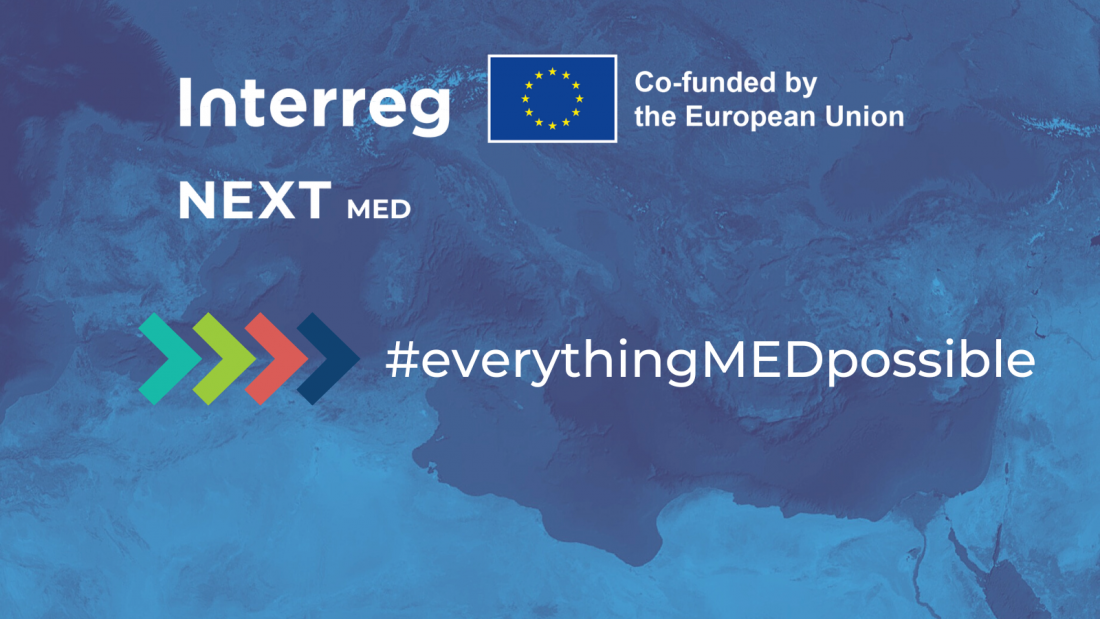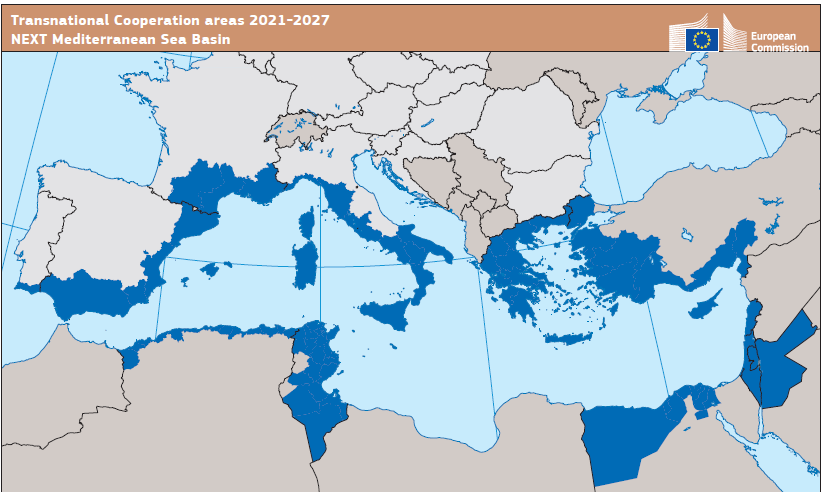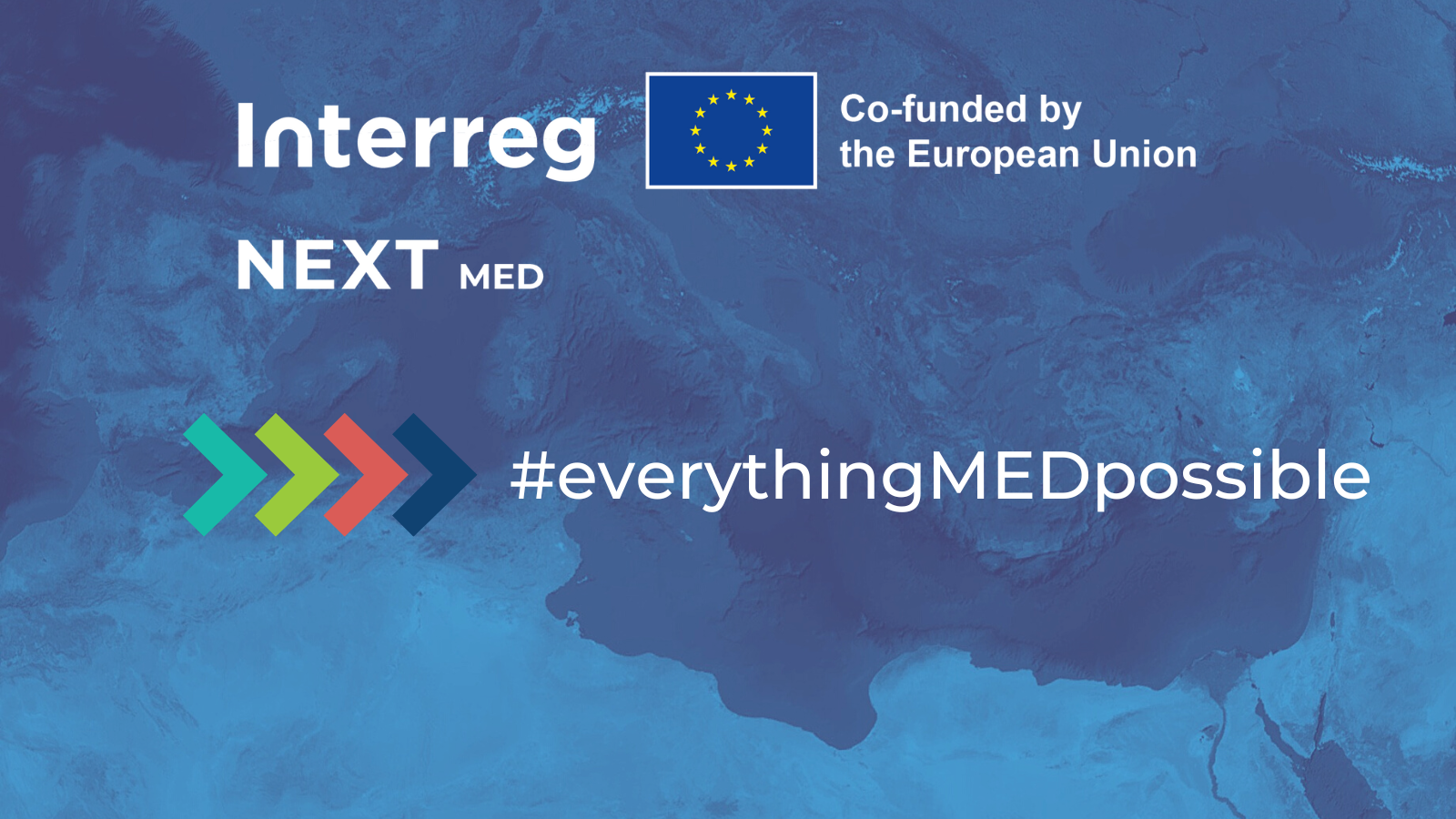Interreg ‘NEXT MED’: discover the new EU-funded transnational programme for cooperation in the Mediterranean area

Interreg NEXT ‘Mediterranean Sea Basin’ (hereinafter ‘NEXT MED’) transnational cooperation programme document was officially submitted to the European Commission at the end of July for final adoption.
The text of the programme is the result of an extensive collaboration work among the national representatives of 15 countries - namely Algeria, Cyprus, Egypt, France, Greece, Israel, Italy, Lebanon, Jordan, Malta, Palestine, Portugal, Spain, Tunisia and Türkiye (Turkey) – and different rounds of consultation which have involved over 500 stakeholders from the Mediterranean region.
Building on the experience and results of the ENPI (2007-2013) and ENI (2014-2020) cross-border cooperation (CBC) Med programmes, NEXT MED will continue supporting Euro-Mediterranean cooperation for the period 2021-2027 under the framework of the European Union’s Cohesion Policy and its specific ‘Interreg’ instrument which supports European Territorial Cooperation across regions and countries. NEXT MED is implemented under strand B ‘Transnational cooperation’ of the external dimension of Interreg, allowing for cooperation over larger transnational territories or around sea basins between EU Member States and Southern Neighbourhood partner countries.
Increased budget
The global amount of the European Union contribution to the Programme is about €253 million, including around €230 million for project funding and €23 million for Technical Assistance (dedicated to the management and implementation), corresponding to 21% increase compared to the ENI CBC Med programme. The budget comes from the European Regional Development Fund (ERDF), the Instrument for Pre-Accession (IPA III and the Neighbourhood, Development and International Cooperation Instrument (NDICI).
The maximum EU contribution per project will be 90% of its total cost, while at least a 10% co-financing shall be ensured by the project partnership.
Joint priorities to address together shared challenges
Interreg NEXT MED aims to contribute to smart, sustainable, fair development for all across the Mediterranean basin by supporting balanced, long-lasting, far-reaching cooperation and multilevel governance. The programme mission is to finance cooperation projects that address joint socio-economic, environmental and governance challenges at Mediterranean level such as the uptake of advanced technologies, competitiveness of SMEs and job creation, energy efficiency, sustainable water management, climate change adaptation, transition to a circular and resource efficient economy, education and training, health care, etc.
NETX MED thematic strategy is structured around 4 broad objectives, declined into 9 specific objectives as follows:
Policy Objective 1 ‘A more competitive and smarter Mediterranean’ by
- Developing and enhancing research and innovation capacities and the uptake of advanced technologies
- Enhancing sustainable growth and competitiveness of SMEs and job creation in SMEs, including by productive investments
A total of €66.6 million is allocated to Policy Objective 1, corresponding to 29% of the Programme budget.
Policy Objective 2 ‘A greener, low-carbon and resilient Mediterranean’ by
- Promoting energy efficiency and reducing greenhouse gas emissions
- Promoting climate change adaptation and disaster risk prevention, resilience taking into account eco-system based approaches
- Promoting access to water and sustainable water management
- Promoting the transition to a circular and resource efficient economy
A total of €96.9 million is allocated to Policy Objective 2, corresponding to 42% of the Programme budget.
Policy Objective 3 ‘A more social and inclusive Mediterranean’ by
- Improving equal access to inclusive and quality services in education, training and lifelong learning through developing accessible infrastructure, including by fostering resilience for distance and on-line education and training
- Ensuring equal access to health care and fostering resilience of health systems, including primary care, and promoting the transition from institutional to family- and community-based care
A total of €48.8 million is allocated to Policy Objective 3, corresponding to 21% of the Programme budget.
Interreg specific objective ‘A better cooperation governance for the Mediterranean’ by
- Fostering local governance models and processes through cross-sectoral, multilevel and cross-border partnerships, encouraging the cooperation and dialogue between citizens, civil society actors and institutions in view of addressing issues of joint interest at local level through transnational exchanges, bottom-up and participatory approaches.
A total of €17.7 million is allocated to the Interreg Specific Objective, corresponding to 8% of the Programme budget.
A larger cooperation area
As compared to the two previous programming periods, Interreg NEXT MED expands its territorial dimension to cover 15 countries - Algeria, Cyprus, Egypt, France, Greece, Israel, Italy, Lebanon, Jordan, Malta, Palestine, Portugal, Spain, Tunisia and Türkiye – representing over 90 territories. 
Map of Interreg NEXT MED cooperation area (as provided by the European Commission)
Next steps
The final adoption of the NEXT MED Programme by the European Commission is expected by the end of 2022. In parallel, the signing process of the Financing Agreements between each participating Mediterranean Southern country will be launched: this is a fundamental step to allow non-EU countries to be participate in calls for proposals and be eligible to receive funding from the NEXT MED Programme.
The first call for proposals is expected to be launched starting from mid-2023 and will tackle all Programme Policy and Specific Objectives as described above.
Stay tuned as more information will be available throughout the year and get ready to join this new Mediterranean cooperation adventure.
Consult the Interreg NEXT MED Programme document (draft submitted to the European Commission for approval. Please note that this might be not the final version of the Programme since a consultation with the European Commission services is ongoing).










